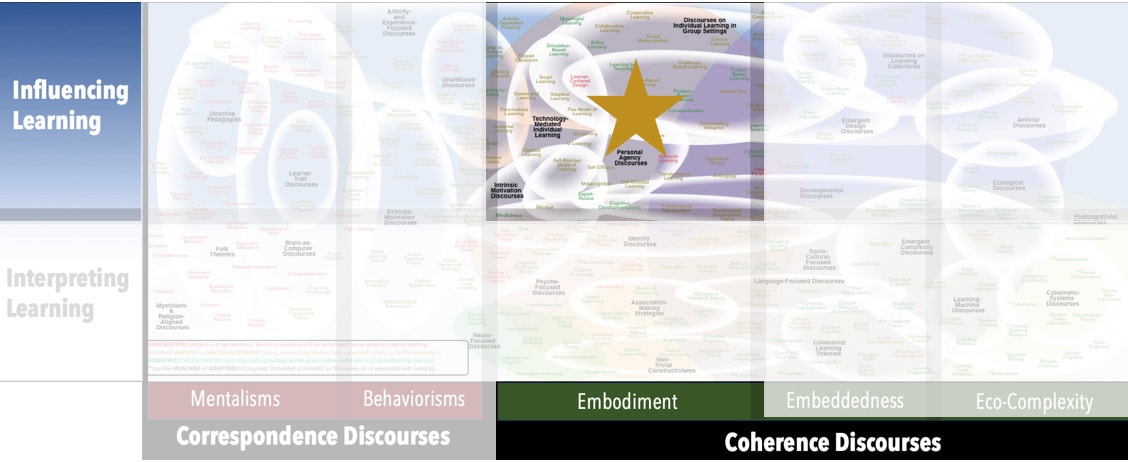AKA
Transformational Theory
Focus
Developing self-understanding through critical reflectionPrincipal Metaphors
- Knowledge is … scope of interpretations and actions
- Knowing is … frames of reference (that orient self-understanding, beliefs, and actions)
- Learner is … a rational agent
- Learning is … perspective transformation (through construing, validating, and reformulating the meaning of experiences)
- Teaching is … triggering reflection
Originated
1970sSynopsis
Transformative Learning is concerned with the expansion of consciousness through critical reflection on beliefs and experiences. It focuses on three sites of “perspective transformation”: psychological (self), convictional (beliefs), and behavioral (lifestyle). Transformative Learning involves rational efforts to analyze and reformulate habits of action and deep-seated assumptions. Such analysis is frequently triggered by major disorienting events, but teachers can create less dramatic situations and quandaries to promote transformation. (Note that Transformative Learning is distinct from, but sometimes conflated with Transformative Pedagogy.) Precursors, associated constructs, and associated discourses (listed chronologically, by decade) include:- Five Psychological Transformation Phases of Change (Daryl Connor, 1970s) – a model that outlines the emotional and psychological responses individuals experience when undergoing significant organizational and/or personal change. The five phases are: Stability (feeling secure in the pre-change situation); Disruption (uneasiness immediately triggered by change); Exploration (experimenting with new possibilities); Rebuilding (integrating new thinking and behavior); Commitment (establishing a new stable state).
- Nepantla (Gloria Anzaldùa, 1980s) – a Nahuatl word meaning “middle” or “in the middle of,” a reference to the sorts of self-awareness and personal transformations that can be prompted by questioning foundational beliefs, practices, and roles as encountered in one’s familial, social, linguistic, and educational spheres
- Phases of Transformative Learning (Perspective Transformation Stages) (Jack Mezirow, 1990s) – a sequence of stages in the Transformative Learning process. There are many variations, ranging from 4 to 10 steps. One popular version involves (1) a disorienting dilemma, (2) self-examination, (3) critical assessment of assumptions, (4) planning a course of action, (5) knowledge and skill development, (6) trying new roles, (7) building self-efficacy, (8) re-integration.
- Contextualized Model of Adult Learning (Kathleen King, 2000s) – a framework for activating the Transformative Learning process. The model focuses on providing supports for probing assumptions, and it involves a teacher-created learning plan based on an initial learner assessment followed by an iterative cycle of learning and interactive formative assessment.
- Stages of Transition Theory (Judy Boychuk Duchscher, 2000s) – a three-stage model that describes the rapid evolution of professional identity and expertise in high-stress contexts. The stages are: Doing (becoming aware of, adjusting to, and accommodating to workplace realities and pressures through performing); Being (rapid development of skills, knowledge, and reasoning – prompting some questioning and doubt); Knowing (emergence of confidence and individuation – enabling both critique and acceptance).
Commentary
Transformative Learning draws on Psychoanalytic Theories (e.g., the existence and role of the unconscious) and Developmental Discourses (i.e., descriptions of significant transformational learnings bear strong resemblances to accounts of stage-based developments), but these associations and sources are not always well cited. Transformative Learning is thus subject to the same sorts of criticisms as those theories. It is also criticized for its (over)emphasis on rationality – which may be unfair, since it is a theory on using rationality to address frames of reference that may be unconscious and irrational. In addition, proponents of Transformative Learning often invoke Folk Theories, particularly the Acquisition Metaphor, indicating either a disinterest in or a shallow knowledge of the actual complex dynamics of learning.Authors and/or Prominent Influences
Jack MezirowStatus as a Theory of Learning
By its own admission, Transformative Learning addresses only one category of learning, and within that it focuses more on the role of the learner (as an active agent in the resolution of dilemma) than the nature (i.e., the complex dynamics) of learning. Consequently, it is more a philosophy of education than a theory of learning.Status as a Theory of Teaching
Transformative Learning is better construed as a theory of teaching than a theory of learning. With its focus on “disorienting dilemmas,” teaching is cast mainly in terms of analytic and interpretive assistance within those dilemmas. That means that hoped-for learnings cannot be guaranteed. It also redefines the main purpose of teaching, away from a focus on curriculum-driven content and toward supporting the development of learners’ self-concepts.Status as a Scientific Theory
Transformative Learning is associated with modest body of empirical evidence. However, the failure to attend to metaphors of learning means that this perspective does not meet our requirements of a scientific theory.Subdiscourses:
- Contextualized Model of Adult Learning
- Five Psychological Transformation Phases of Change
- Nepantla
- Phases of Transformative Learning (Perspective Transformation Stages)
- Stages of Transition Theory
Map Location

Please cite this article as:
Davis, B., & Francis, K. (2025). “Transformative Learning” in Discourses on Learning in Education. https://learningdiscourses.com.
⇦ Back to Map
⇦ Back to List
